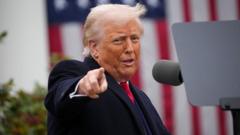**As Trump pauses higher tariffs on various nations, he imposes dramatic increases on Chinese imports, reflecting escalating trade tensions.**
**Trump Implements 90-Day Tariff Delay Amid Intensified Trade Conflict with China**

**Trump Implements 90-Day Tariff Delay Amid Intensified Trade Conflict with China**
**President's policy shift brings temporary relief to many countries but raises stakes in US-China trade war.**
In an unexpected turn of events, President Donald Trump has declared a 90-day suspension of higher tariffs for most countries impacted by the recent tariff hikes. This announcement comes mere hours after new tariffs on approximately 60 nations were enforced, marking a significant pivot in policy. While extending relief to many countries, he simultaneously intensified the ongoing trade war with China by raising tariffs on Chinese goods to a staggering 125%. Trump's decision was influenced by China's retaliation, which included a hefty 84% tariff on American imports, further deepening the conflict between the two leading global economies.
This policy reform entails implementing a universal "lowered reciprocal tariff of 10%" on imports from various nations. The baseline tariff of 10% remains in place, but countries labeled as "worst offenders" regarding trade practices, like the European Union, Vietnam, and South Africa, face additional tariffs. The day following Trump's initial tariff announcement saw a drastic market response, with trillions in losses and soaring concerns among American consumers regarding rising prices and potential recession.
In the wake of the suspension announcement, U.S. stock markets responded positively, with the S&P 500 experiencing a 7% surge in afternoon trading. Trump cited an influx of over 75 countries reaching out for trading solutions in light of the new tariffs. However, China remains exempt from this pause, facing immediate implementation of the enhanced tariff. Trump expressed his hope that China would soon recognize the untenability of its current trade practices.
Treasury Secretary Scott Bessent asserted that the pause was not a reaction to global market fluctuations, though critics, including Democrat Chuck Schumer, viewed it as a sign of Trump’s retreat amidst pressure. The ongoing standoff between the U.S. and China escalated following Trump's announcement the previous week, which included a significant 34% additional tariff on Chinese imports, layered atop an earlier 20% levy. Unyielding, Beijing responded with a 34% tariff on U.S. goods, and tensions remain high as both nations dig in their heels for a prolonged economic battle.
China's foreign ministry spokesperson condemned the "bullying practices" of the U.S. while insisting that negotiations must prioritize equality, mutual respect, and reciprocity, highlighting the complex dynamics and deepening fractures in U.S.-China relations.
This policy reform entails implementing a universal "lowered reciprocal tariff of 10%" on imports from various nations. The baseline tariff of 10% remains in place, but countries labeled as "worst offenders" regarding trade practices, like the European Union, Vietnam, and South Africa, face additional tariffs. The day following Trump's initial tariff announcement saw a drastic market response, with trillions in losses and soaring concerns among American consumers regarding rising prices and potential recession.
In the wake of the suspension announcement, U.S. stock markets responded positively, with the S&P 500 experiencing a 7% surge in afternoon trading. Trump cited an influx of over 75 countries reaching out for trading solutions in light of the new tariffs. However, China remains exempt from this pause, facing immediate implementation of the enhanced tariff. Trump expressed his hope that China would soon recognize the untenability of its current trade practices.
Treasury Secretary Scott Bessent asserted that the pause was not a reaction to global market fluctuations, though critics, including Democrat Chuck Schumer, viewed it as a sign of Trump’s retreat amidst pressure. The ongoing standoff between the U.S. and China escalated following Trump's announcement the previous week, which included a significant 34% additional tariff on Chinese imports, layered atop an earlier 20% levy. Unyielding, Beijing responded with a 34% tariff on U.S. goods, and tensions remain high as both nations dig in their heels for a prolonged economic battle.
China's foreign ministry spokesperson condemned the "bullying practices" of the U.S. while insisting that negotiations must prioritize equality, mutual respect, and reciprocity, highlighting the complex dynamics and deepening fractures in U.S.-China relations.





















